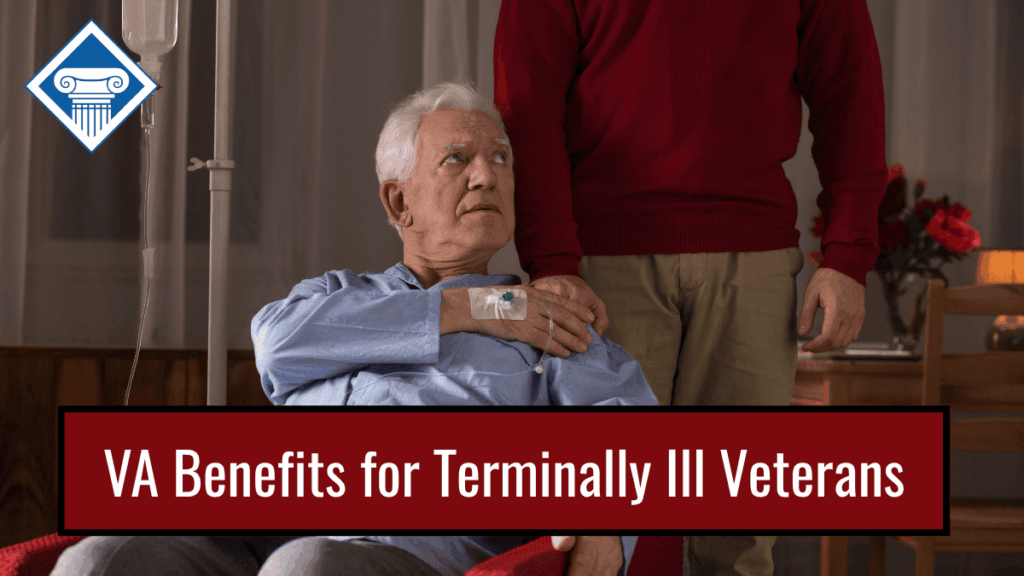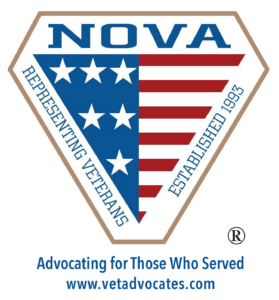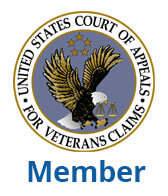Being diagnosed with a terminal illness is something no person wants to face. These topics are hard to discuss, but veterans who receive a terminal prognosis for a service-connected condition will want to ensure they and their loved ones get all the benefits they’re owed from the VA. That’s why it’s vital to understand VA benefits for terminally ill veterans.
Talk to Us About Your Claim:
(812) 426-7200
We explain how expedited processing works, benefits terminally ill veterans may be owed beyond disability compensation, and how they can set their families up to continue receiving the benefits they deserve.
In this article about VA benefits for terminally ill veterans:
Terminal illness in veterans
Terminal illness refers to any irreversible medical condition that is incurable and expected to result in death. Some terminal conditions progress quickly while others are slow to develop.
Common terminal illnesses include:
- Some types of cancer, especially in advanced stages
- Alzheimer’s or dementia
- Congestive heart failure
- HIV/AIDS
- Kidney failure
- Liver failure
Doctors typically treat terminal patients by managing their symptoms to help them live the best possible quality of life for the time they have remaining. This may include palliative or hospice care among other forms of treatment.
While no research is available on the number of veterans who die from terminal illnesses, some of these illnesses, like cancer, are linked directly to exposures they may have faced including burn pit toxins or Agent Orange.
Expedited VA benefits for terminally ill veterans
The VA has a priority processing request to help certain veterans access VA benefits more quickly. This includes PACT Act veterans at risk of homelessness, former POWs, and veterans over the age of 85. Veterans with terminal illnesses also qualify for this expedited process.
When determining if an individual should receive priority processing, the VA considers the likelihood of a veteran passing away before they can complete the typical claims process and receive crucial disability support.
To apply for priority processing, veterans can complete VA form 20-10207 and send it to the VA. Veterans applying due to terminal illness should also include medical evidence showing they’ve been diagnosed with a terminal illness.

VA end-of-life benefits
When a veteran nears the end of their life, the VA provides multiple benefits to assist in making their final days as comfortable as possible. Terminally ill veterans typically qualify to access these benefits.
Palliative care
VA palliative care focuses on relieving suffering and controlling symptoms so the veteran can continue with their daily activities as long as possible. The focus of this type of care is to control the illness as much as possible.
Palliative care can begin when the veteran is diagnosed and may be the more beneficial option before the terminal condition develops to its final stages.
Veterans with VA medical benefits qualify as long as they meet the clinical need for palliative care services, which includes help with physical and emotional symptoms. Veterans may be responsible for co-pays for these services.
Hospice care
VA hospice care is designed for veterans with terminal conditions and less than six months to live. These veterans are no longer seeking treatment other than making the end of their lives comfortable. This care can be provided at home, in an outpatient clinic, or in an inpatient setting like a nursing home. Hospice care also includes physical and emotional support for the veteran and bereavement support for the family.
All veterans receiving VA medical benefits also qualify for hospice care as long as they have a terminal illness and have reached the final months of their life. There are no co-pays for this service.
VA benefits for survivors
Once a veteran passes, their family may need additional support to deal with the loss. It’s important to know what benefits are available to survivors. As a veteran, you can help your loved ones by making them aware of what they are owed by the VA in advance and ensuring they know what documentation they’d need and how to access it.
VA funeral benefits
First, some survivors may qualify for VA funeral benefits. If the veteran’s death is service-connected, the VA will pay up to $2,000 for their burial. Non service-connected deaths can also qualify for a smaller burial allowance of just under $1,000.
The VA can also help pay for a grave stone or marker for the veteran, and in specific cases, transportation of the veteran’s remains. You can learn more about burial allowances and related benefits or apply on the VA’s website.
DIC benefits
Dependency and Indemnity Compensation (DIC) benefits are available for qualifying surviving spouses, children, and parents of veterans. DIC benefits come in the form of a monthly check of around $1,699.36 from the VA.
To qualify, a survivor must prove their relationship with the veteran and that the veteran met one of the following criteria:
- The veteran died from a service-connected illness or injury (or the veteran’s service-connected disability contributed to the veteran’s passing), or
- The veteran didn’t die from a service-connected illness or injury but was eligible to receive VA compensation for a service-connected disability rated as totally disabling for a “certain period of time”* before their death, or
- The service member died while on active duty, active duty for training, or inactive-duty training.
*A certain period of time can here mean the veteran was eligible to receive VA compensation for a totally disabling service-connected condition:
- For at least 10 years before their death, or
- Since their release from active duty and at least 5 years immediately before their death, or
- For at least 1 year before their death if they were a former POW who died after September 30, 1999
Other survivor benefits
Qualifying surviving spouses and dependent children may also be eligible for a monthly survivor’s pension if their veteran served during wartime and they meet certain income limits.
Survivors’ and Dependents’ Educational Assistance (DEA), sometimes referred to as Chapter 35 benefits, are also available to help pay for job training or schooling for eligible survivors. Qualifications include your veteran passing from a terminal service-connected condition.
“They made me feel like I was important and that my claim was important. With the VA process as complicated and time-consuming as it is, Woods & Woods was there for me every step of the way. I thank them very much for their hard work and compassion. I could have never done this on my own.”

D.W., Navy veteran from South Carolina
From a Google review for Woods & Woods
How Woods & Woods can help
At Woods & Woods, we focus on helping non-working veterans with service-connected conditions get individual unemployability benefits and, in some cases, increased ratings. We also help survivors of veterans receive their DIC benefits. If you think we can help you with your claim, call us today for a free case evaluation. You won’t pay us unless we take and win your case.
Talk to Us About Your Claim:
(812) 426-7200
Frequently asked questions
Yes, the VA offers qualifying veterans multiple end-of-life benefits, including priority processing and access to more affordable palliative and hospice care. The VA also provides funeral and survivor benefits to assist veterans’ loved ones.
Yes. When a veteran dies, their surviving spouse, children, or parents may still be eligible for various VA benefits, including DIC, a survivor’s pension, and burial benefits.





